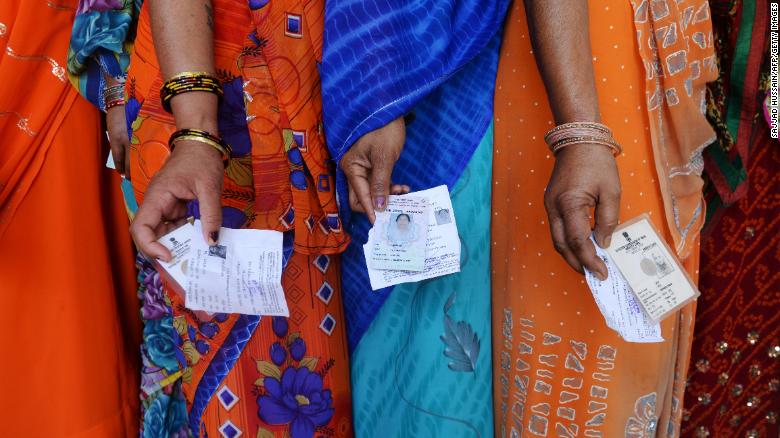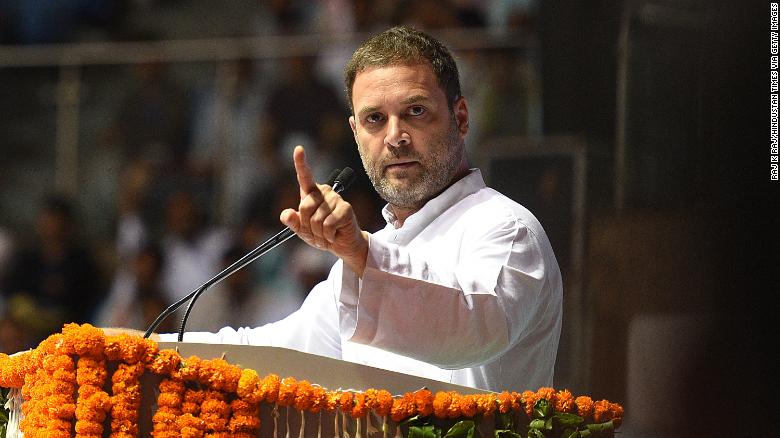https://www.youtube.com/watch?v=rFj29PBZWQc
It is finally on: India’s next general election will be held in seven phases from 11 April to 19 May, the country’s election authorities announced Sunday, after weeks of anticipation.
Politicians, including Indian Prime Minister Narendra Modi, who is seeking re-election, have already started campaigning for what is shaping up to be a surprisingly unpredictable contest.
For days now, India’s newspapers have been full of advertisements trumpeting the achievements of various political leaders, as everyone limbers up for the once in a five year fight.
Until recently, Modi, who won office in a landslide in 2014, and who remains popular with wide swathes of the country, was seen as an almost certain bet in the face of a still fragmented opposition.
But there are growing questions over his record. Although India has continued to grow robustly in recent years, too many of the country’s young people are still struggling to find work.
Out in India’s villages, there is evidence of distress among farmers — a major voting bloc.
Modi received a boost with his tough stance on arch rival Pakistan in February, but with questions still lingering over what happened between the two nuclear armed neighbors, it’s unclear how the sparring will ultimately play out during voting.
Against this backdrop, as the country’s heads for the world’s biggest exercise in democracy, here is a look at the major issues in this election.
Jobs, jobs, jobs
Among Modi’s big achievements when he first ran for national office in 2014 was turning what is a parliamentary political contest into a presidential style showdown.
Indians vote for their local constituency parliamentary members (MPs), and the party that ends up with the largest number of MPs gets to choose the Prime Minister.
But five years ago, Modi made the election all about himself and what he would do if he won. And one of his main promises was overhauling India’s economy.
Reforms in the early 1990s made the Indian economy more market friendly, and generated high levels of growth. A new wave of prosperity was unleashed.
But over the years the country has struggled to generate enough jobs for its mass of young people.
It’s a giant challenge. More than half of Indians are aged 25 or under, and some 12 million enter the workforce each year.
Modi promised to ensure that, with growth, there would also be jobs for this key electoral constituency.
Speaking at a meeting of the Bharatiya Janata Party (BJP) just months before the 2014 polls, he lamented the lack of work for India’s young people: “The country… has such immense youth capital, but is yearning for employment, what kind of situation is this… !”
Now, experts say the situation has only gotten worse: New figures from the independent researchers at the Center for Monitoring Indian Economy (CMIE) show that joblessness is rising.
To make matters worse, the number of Indians in employment or actively looking for work is falling — a worrying combination for any economy.
According to the CMIE, the unemployment rate in February this year stood at 7.2%, up from 5% in February, 2017. Meanwhile, India’s farmers have staged numerous protests in recent years, amid reports of falling incomes and increasing distress in the farm sector.
This could spell trouble for Modi. Back in December, when his BJP lost a clutch of key state level elections, analysts were quick to point to the impact of these factors.
National security
The sudden spike in tensions between India and Pakistan in February, just weeks before the election announcement, has put national security firmly on the agenda — even if it’s not clear how it’ll impact voter behavior.
The spark was a devastating attack on Indian paramilitaries in the disputed Kashmir region on Feb 14.
In response, the Modi government says it launched airstrikes on a terror training camp inside Pakistan to prevent further atrocities.
Pakistan disputes India’s narrative, saying Indian jets were driven back, and it retaliated with its own strikes that led to an aerial dogfight and the capture of an Indian pilot. The pilot’s release later helped cool tensions.
While the Indian government says it eliminated a “very large number” of terrorists with its airstrikes and insists the operation was a success, it has repeatedly declined to put a figure on how many terrorists it killed, or release other details about what it struck.
That hasn’t stopped Modi’s allies from using the Indian airstrikes as a campaign talking point. As CNN affiliate CNN-News18 reports, at one recent public gathering, Amit Shah, the President of the BJP and one of Modi’s closest political colleagues, said: “Under Modi’s leadership, the government carried out an airstrike… and killed more than 250 terrorists.”
The BJP, which has its roots in India’s majoritarian Hindu right wing movement, has always sought to portray itself as strong on defense, especially when it comes to the country’s Muslim neighbor Pakistan.
But the claim of more than 250 dead has prompted questions from Modi’s opponents, including the principal opposition Indian National Congress party led by Rahul Gandhi. “Where are these figures coming from?” asked one of the Congress’s spokesmen.
BJP President @AmitShah claimed that 250 were killed in airstrikes. Some said 300, while some others said 350. Where are these figures coming from? Air Chief Marshal clearly said that it is govt's duty to count casualties: @SinghRPN #BJPkaJhoothSabseMazboot
Watch the highlights: pic.twitter.com/7WTB3WVGYc
— Congress (@INCIndia) March 4, 2019
Modi, in response, says the opposition’s questions were chipping away at the moral of India’s armed forces. “They are asking for proof of our strikes on terrorist training camps,” he said at a recent public rally. “I want to ask the Congress and its allies: Why are they trying to demoralize our forces?”
A weak opposition
For all its recent troubles, the BJP and its brand of Hindu nationalism under Modi have made the party the most potent force in Indian politics in recent years, one that the opposition has struggled to counter.
Rahul Gandhi’s Congress was once seen as the natural party of government.
Gandhi is the son of former Indian Prime Minister Rajiv Gandhi. His grandmother Indira was India’s first female leader, and his grandfather, Jawarhlal Nehru, was the country’s founding Prime Minister.
But during the last election, Congress limped home with just 44 parliamentary seats out of a total of 545 in the 2014 election. Other smaller regional players were also decimated.
The BJP won 282, the biggest majority for any one party in thirty years. With its allies, the BJP was comfortably north of the 300 seat mark.
Wounded by the BJP’s electoral machine, the opposition has too often resorted to portraying itself as simply anti Modi, instead of presenting an alternative vision for the country, as the Indian Express daily pointed out in a recent editorial.
The BJP, for example, has been accused of emboldening hardline Hindu vigilantes who consider the cow a sacred animal.
They have mounted a violent campaign against beef eating and those involved in the cattle trade in recent years that Human Rights Watch says has led to the death of at least 44 people, including 36 Muslims.
But the Congress, while criticizing the violence, has also been accused of playing politics over the issue of cow protection as it attempts to appeal to orthodox Hindus.
“So far, the best case being made by parties that have ranged themselves against the Modi-BJP is that they are anti Modi-BJP,” the Indian Express said in February.
Will it be enough? The answer will become clear on May 23, when the ballots are counted.



